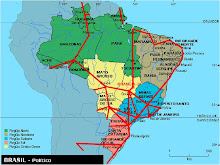Managing the Amazon: A Global Responsibility?
• Carlos Eduardo de Souza Braga• Pamela Cox• Luiz Fernando Furlan•Marcelo Furtado•Luiz Carlos de Miranda JoelsModerated by • Nik Gowing
Thursday 16 April14.00-15.00
Nik Gowing, Main Presenter of BBC World News, United Kingdom, said the debate would be broadcast 9 May on BBC World. He asked the panel how grave a threat the Amazon faces and how the international community can cooperate to find a solution. Gowing said that the Amazon is an important carbon sink and a climate change regulator. He added that Brazil, the biggest of eight countries within the Amazon rainforest, is the world’s fourth largest emitter of greenhouse gases (GHGs) and three-fifths of its GHG emissions come from deforestation.
Pamela Cox, Vice-President, Latin America and the Caribbean, World Bank, Washington DC, said that although 40% of the Amazon is protected on paper, “it is impossible to police the entire Amazon and the private sector needs incentives to use the rainforest in a sustainable way.”
Carlos Eduardo de Souza Braga, Governor of Amazonas, Brazil, said that one such incentive would be to pay Amazon landowners to preserve the forest. “That way they will understand that standing trees have value, more value that cutting them down,” said Braga. “They would realize that they could feed their families and save the forest at the same time.”
Luiz Fernando Furlan, President, Foundation for a Sustainable Amazon, Brazil, called upon a “greater mobilization of the business community to sustainably work the rainforest through public/private cooperation.” He added that the private sector is better at sustainably working the rainforest and the government is better at regulating that sustainable use.
Currently, pubic-private sector cooperation in the Amazon rainforest includes government-regulated concessions which allow the public sector to do sustainable, low-impact logging, and big infrastructure projects such as paved Amazon highways and huge dams which have major environmental impacts.
Marcelo Furtado, Executive Director, Greenpeace International, Brazil, said, “the Brazilian government doesn’t have a plan or a vision to save the Amazon” and mentioned the government is spearheading public-private Amazon dam projects rather than providing incentives for non-hydro, renewable energy sources such as biomass and wind generation. He added that the ministry of agriculture is pushing to expand the soy and cattle ranching frontier in the southern Amazon and that the transport ministry is promoting the building of a paved highway (BR-319) to connect two western Amazon state capitals, even though a railway would impact the forest much less and not provide a conduit to illegal colonization.
Braga, through whose state part of the highway will run, said: “I tried and failed to get national and international support to build a railway connecting the two Amazon capitals. But ever since the BR-39 highway became the only infrastructure option, I have tried to protect the forest against illegal colonization and deforestation along it.”
Luiz Carlos de Miranda Joels, Director, Brazilian Forestry Service, an arm of the environment ministry, said efforts are being taken to preserve the forest around BR-319. He added that in the last few years, the Brazilian Amazon deforestation rate has dropped by 60%, largely because of a government anti-deforestation programme.
Furtado said that while the government programme helped to curb Amazon deforestation, falling beef and commodity prices, the main drivers of Amazon deforestation, were the main reason for the decreased deforestation rate.
Key points:• Panellists agreed that the Amazon faces a grave threat if the rate of deforestation cannot be reduced• Panellists all supported public-private partnerships to sustainably work the rainforest• Panellists disagreed about how partnerships should work and about the efficacy of existing public-private partnerships in preserving the Amazon rainforest.
Saturday, April 18, 2009
Subscribe to:
Post Comments (Atom)


No comments:
Post a Comment